75 Angela Davis Quotes That Reflect Her Commitment to Equality & Justice
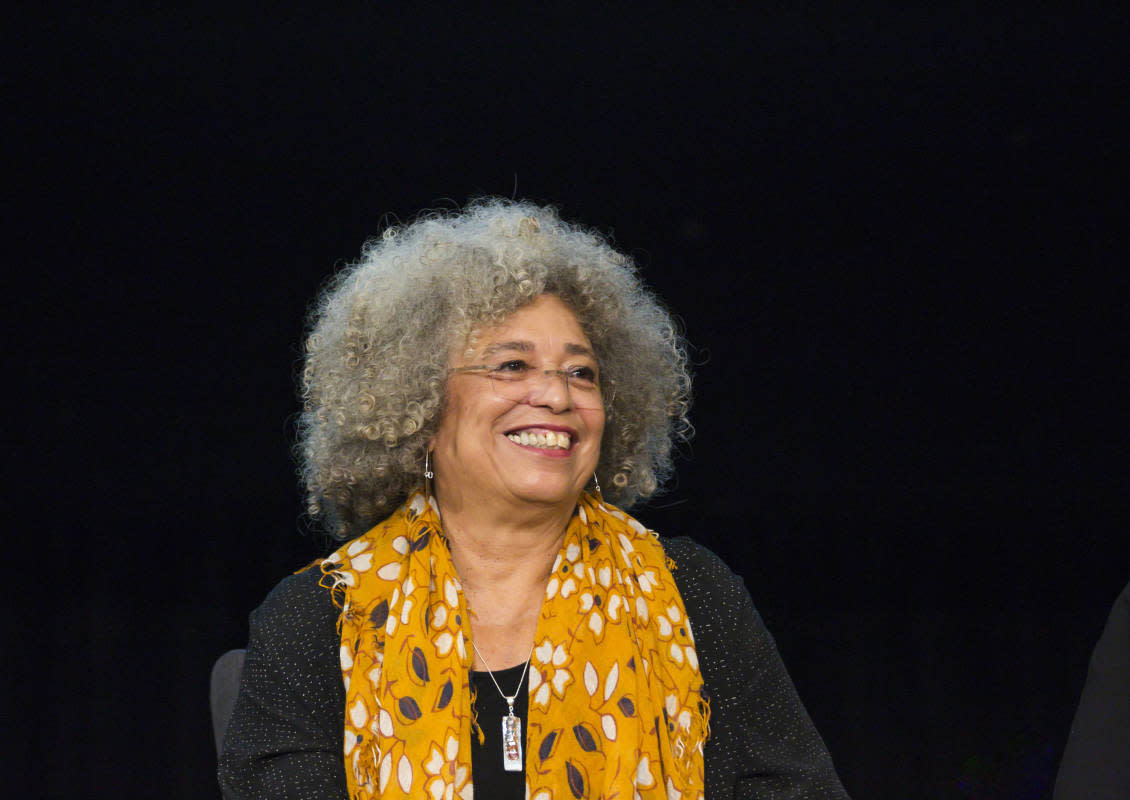
Political activist Angela Davis has been a prominent figure in the Civil Rights Movement. During her Birmingham, Alabama upbringing, she experienced racism when the Ku Klux Klan infiltrated her middle-class neighborhood and attacked residents. Her exposure to activism began during this time as her mother participated in a local civil rights organization to speak out on racial injustices. Given these experiences, and more that would transpire, there are plenty of Angela Davis quotes that paint a picture of her life.
One of the turning points in Davis’ life was in her junior year of high school, where she participated in the American Friends Service Committee (Quaker) program that paired Black southern students with integrated schools in the North. She attended a progressive New York City school where she joined the youth Communist group, which supported what she already learned from her parents. She remained a member of the Community Party until 1991.
Davis’ life has been a roller coaster of events that would shape her life. Her political opinions caused her to be terminated as a university professor, and she served 16 months in prison for her suspected involvement in a criminal case. While she was acquitted, she gained worldwide notoriety during a 1970 "Free Angela Davis” movement aimed at releasing her. During her incarceration, she was inspired to change the prison system and eventually founded several advocacy organizations.
Angela Davis is known for being very vocal about advocating for the oppressed. She’s an award-winning author, an advocate for the LGBTQ+ community and prison reform, and an international lecturer. While she has been labeled a radical, feminist and a militant, her words continue to inspire individuals fighting for freedom, equality and justice. Here are 75 of Angela Davis’ most famous quotes.
Related: 22 Ida B. Wells Quotes About Injustice, Truth and Virtue
75 Angela Davis Quotes
1. "I am no longer accepting the things I cannot change. I am changing the things I cannot accept."
2. "We have to talk about liberating minds as well as liberating society."
3. "Anyone who's interested in making change in the world, also has to learn how to take care of herself, himself, theirselves."
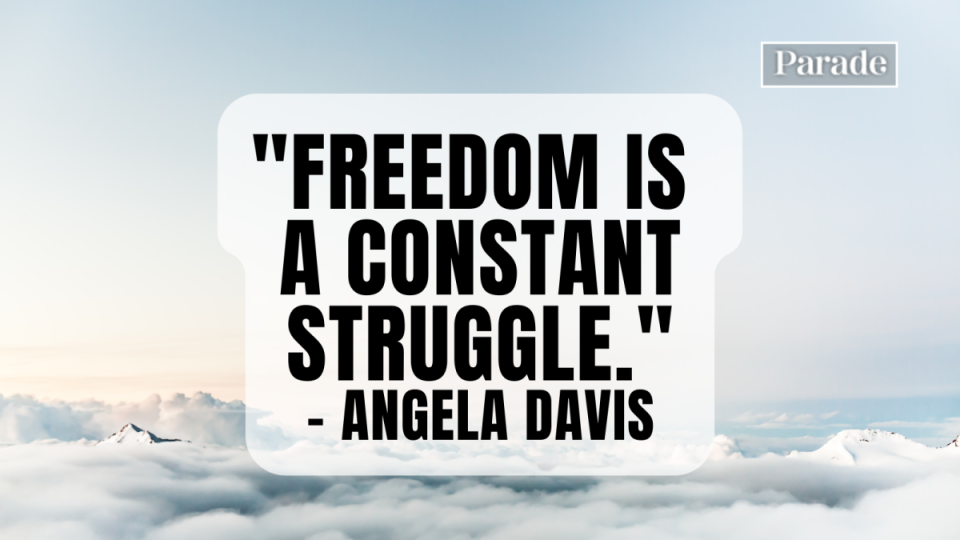
Canva
4. "Freedom is a constant struggle."
5. "I have a hard time accepting diversity as a synonym for justice. Diversity is a corporate strategy."
6. "We know the road to freedom has always been stalked by death."
7. "The process of empowerment cannot be simplistically defined in accordance with our own particular class interests. We must learn to lift as we climb."
8. "In a racist society, it is not enough to be non-racist, we must be anti-racist."
9. "The idea of freedom is inspiring. But what does it mean? If you are free in a political sense but have no food, what's that? The freedom to starve?"
Related: What Is Juneteenth? Everything To Know About the Integral Day in Black History
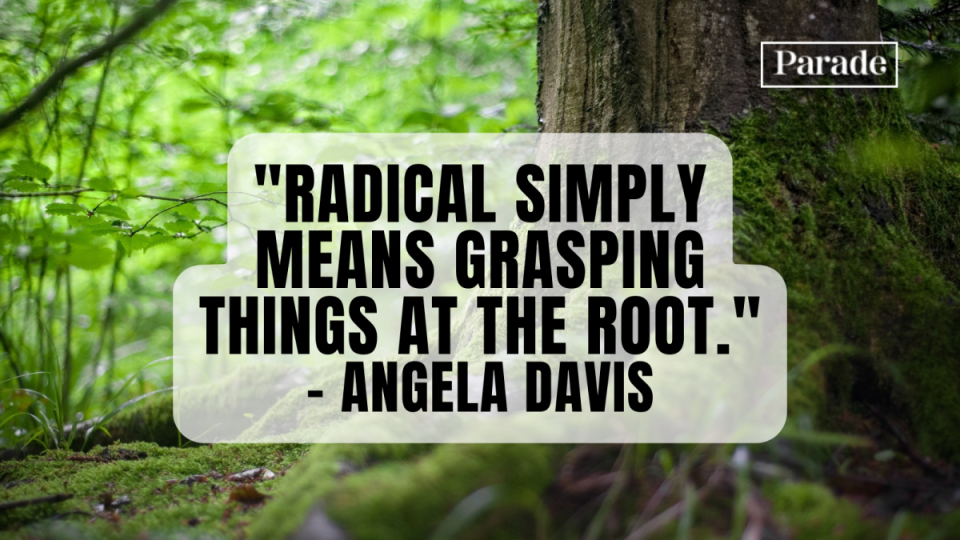
Canva
10. "Radical simply means grasping things at the root."
11. "You have to act as if it were possible to radically transform the world. And you have to do it all the time."
12. "My name became known because I was, one might say accidentally the target of state repression and because so many people throughout the country and other parts of the world organized around the demand for my freedom."
13. "Revolution is a serious thing, the most serious thing about a revolutionary’s life. When one commits oneself to the struggle, it must be for a lifetime."
14. "Imprisonment is increasingly used as a strategy of deflection of the underlying social problems—racism, poverty, unemployment, lack of education, and so on."
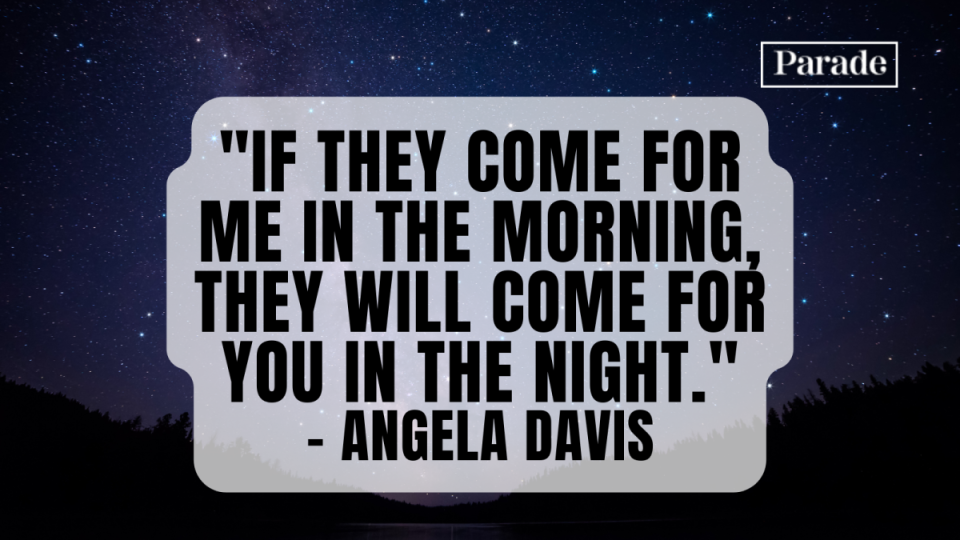
Canva
15. "If they come for me in the morning, they will come for you in the night."
16. "Sometimes we have to do the work even though we don't yet see a glimmer on the horizon that it's actually going to be possible."
17. "Prisons do not disappear social problems, they disappear human beings."
18. "I decided to teach because I think that any person who studies philosophy has to be involved actively."
19. "The work of the political activist inevitably involves a certain tension between the requirement that position be taken on current issues as they arise and the desire that one’s contributions will somehow survive the ravages of time."
20. "Human beings cannot be willed and molded into non-existence."
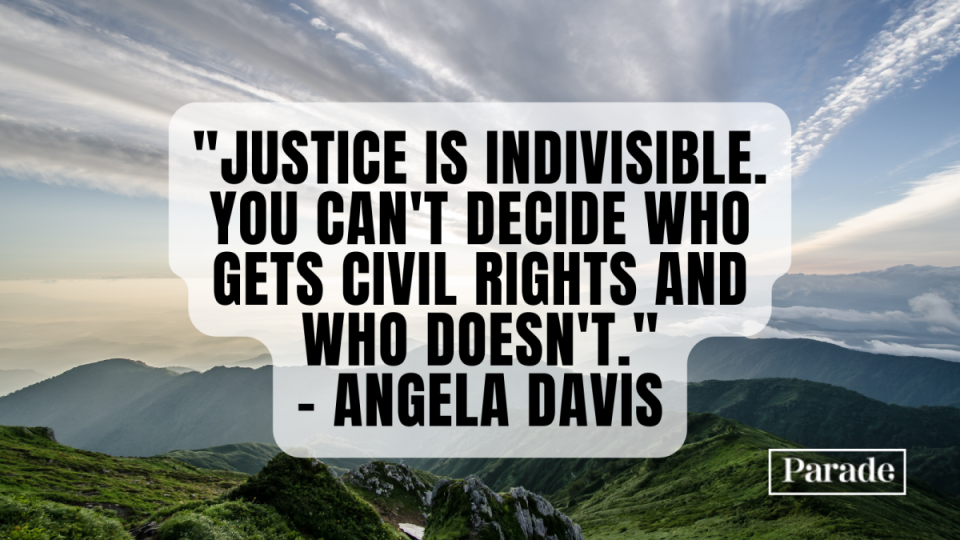
Canva
21. "Justice is indivisible. You can't decide who gets civil rights and who doesn't."
22. "We live in a society of an imposed forgetfulness, a society that depends on public amnesia."
23. "Black women have had to develop a larger vision of our society than perhaps any other group. They have had to understand white men, white women, and Black men. And they have had to understand themselves. When Black women win victories, it is a boost for virtually every segment of society."
24. "Placing the question of violence at the forefront almost inevitably serves to obscure the issues that are at the center of struggles for justice."
25. "To understand how any society functions you must understand the relationship between the men and the women."
26. "The campaign against the death penalty has been – while a powerful campaign, its participants have been those who attend all of the vigils, a relatively small number of people."
27. "I think that many people have forgotten that, if knowledge is to have any meaning, if it is to be useful, it should have an impact in the world."
28. "But rather, we celebrate Black history, I believe, because it is a centuries-old struggle to achieve and expand freedom for us all. And so Black history is indeed American history, but it is also world history."
29. "Jails and prisons are designed to break human beings, to convert the population into specimens in a zoo – obedient to our keepers, but dangerous to each other."
30. "When children attend schools that place a greater value on discipline and security than on knowledge and intellectual development, they are attending prep schools for prison."
Related: 'A Man Who Stands for Nothing Will Fall for Anything'—Here Are 150 of the Best Malcolm X Quotes
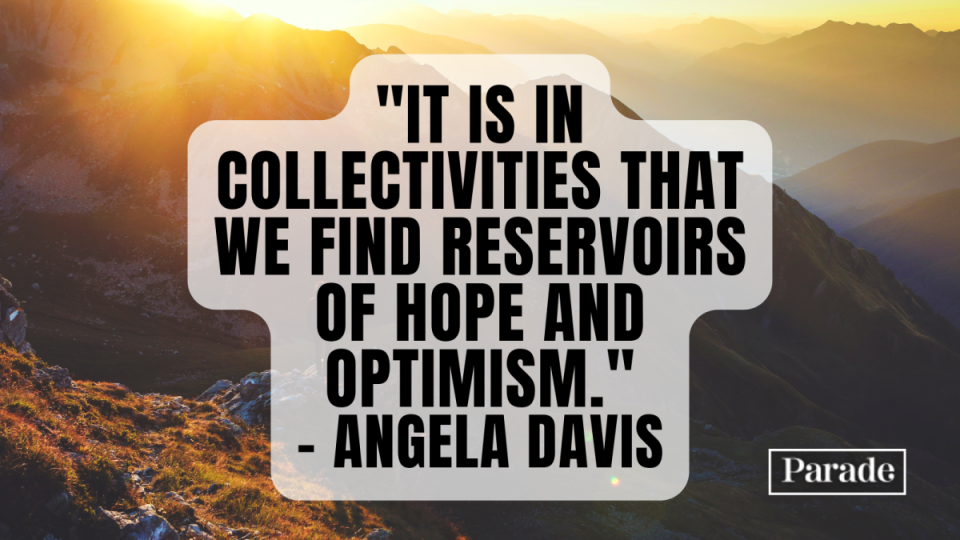
Canva
31. "It is in collectivities that we find reservoirs of hope and optimism."
32. "I try never to take myself for granted as somebody who should be out there speaking. Rather, I’m doing it only because I feel there’s something important that needs to be conveyed."
33. "Anyway I don't think we can rely on governments, regardless of who is in power, to do the work that only mass movements can do."
34. "If we do not know how to meaningfully talk about racism, our actions will move in misleading directions."
35. "Deviant men have been constructed as criminal, while deviant women have been constructed as insane."
36. "As many times as I’ve spoken during Black History Month, I never tire of urging people to remember that it wasn’t a single individual or two who created that movement, that, as a matter of fact, it was largely women within collective contexts, Black women, poor Black women who were maids, washerwomen, and cooks. These were the people who collectively refused to ride the bus."
37. "Walls turned sideways are bridges."
38. "Feminism insists on methods of thought and action that urge us to think about things together that appear to be separate, and to disaggregate things that appear to naturally belong together."
39. "The prison has become a black hole into which the detritus of contemporary capitalism is deposited. Mass imprisonment generates profits as it devours social wealth, and thus it tends to reproduce the very conditions that lead people to prison."
40. "Communities are always political projects, political projects that can never solely rely on identity."
41. "But the important word here is probably not the one you are thinking of. It’s trying. Trying and trying again. Never stopping. That is a victory in itself."
42. "No amount of psychological therapy or group training can effectively address racism in this country, unless we also begin to dismantle the structures of racism."
43. "I think that this is an era where we have to encourage that sense of community particularly at a time when neoliberalism attempts to force people to think of themselves only in individual terms and not in collective terms. It is in collectivities that we find reservoirs of hope and optimism."
44. "When Black women stand up— as they did during the Montgomery Bus Boycott—as they did during the Black liberation era, earth-shaking changes occur."
45. "I never saw myself as an individual who had any particular leadership powers."
46. "What this country needs is more unemployed politicians."
47. "The process of trying to assimilate into an existing category in many ways runs counter to efforts to produce radical or revolutionary results."
48. "Movements are most powerful when they begin to affect the vision and perspective of those who do not necessarily associate themselves with those movements."
49. "It doesn’t matter that a Black woman heads the national police. The technology, the regimes, the targets are still the same."
50. "I think in black communities today we need to encourage a lot more cross-racial organizing."
51. "[Trans women] have to fight to be included within the category “woman” in a way that is not dissimilar from the earlier struggles of Black women and women of color who were assigned the gender female at birth."
52. "We have been basically persuaded that we should not talk about racism."
53. "It is both humiliating and humbling to discover that a single generation after the events that constructed me as a public personality, I am remembered as a hairdo."
54. "How can we produce a sense of belonging to communities in struggle that is not evaporated by the onslaught of our everyday routines? How do we build movements capable of generating the power to compel governments and corporations to curtail their violence?"
55. "You can't criticize people for wanting to have a decent life or wanting to live decently."
56. "I grew up in the southern United States in a city which at that time during the late ’40’s and early ’50’s was the most segregated city in the country, and in a sense learning how to oppose the status quo was a question of survival."
Related: 55 of Dr. Martin Luther King, Jr.'s Most Inspiring Motivational Quotes
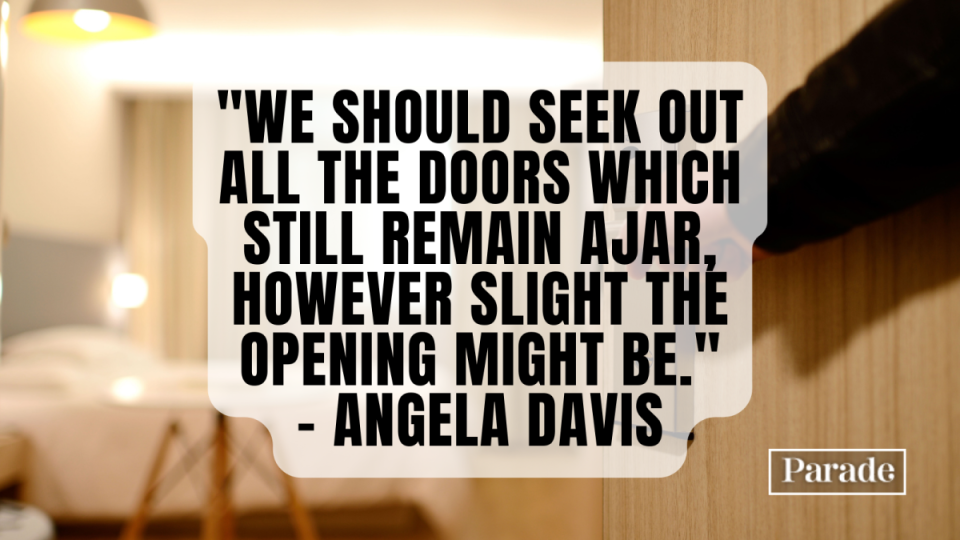
57. "We should seek out all the doors which still remain ajar, however slight the opening might be."
58. "You can never stop and as older people, we have to learn how to take leadership from the youth and I guess I would say that this is what I'm attempting to do right now."
59. "I often like to talk about feminism not as something that adheres to bodies, not as something grounded in gendered bodies, but as an approach - as a way of conceptualizing, as a methodology, as a guide to strategies for struggle. That means feminism doesn't belong to anyone in particular."
60. "Whenever you conceptualize social justice struggles, you will always defeat your own purposes if you cannot imagine the people around whom you are struggling as equal partners."
61. "Optimism is an absolute necessity, even if it's only optimism of the will, as Gramsci said, and pessimism of the intellect."
62. "We will have to go to great lengths. We cannot go on as usual. We cannot pivot the center. We cannot be moderate. We will have to be willing to stand up and say no with our combined spirits, our collective intellects, and our many bodies."
63. "This movement was something so extraordinary, not only because it saved my life – and that was a major accomplishment – but also because it demonstrated that change was possible as a result of organized, mass pressure."
64. "According to a recent study, there may be twice as many people suffering from mental illness who are in jails and prisons than there are in all psychiatric hospitals in the United States combined."
65. "The freedom movement was expansive. It was about transforming the entire country. It was not simply about acquiring civil rights within a framework that itself would not change."
66. "The challenge of the twenty-first century is not to demand equal opportunity to participate in the machinery of oppression. Rather, it is to identify and dismantle those structures in which racism continues to be embedded."
67. "But racism persists in a framework that is far more expansive, far vaster than the legal framework."
68. "The food we eat masks so much cruelty. The fact that we can sit down and eat a piece of chicken without thinking about the horrendous conditions under which chickens are industrially bred in this country is a sign of the dangers of capitalism, how capitalism has colonized our minds. The fact that we look no further than the commodity itself, the fact that we refuse to understand the relationships that underly the commodities that we use on a daily basis. And so food is like that."
69. "I would say that as our struggles mature, they produce new ideas, new issues, and new terrains on which we engage in the quest for freedom. Like Nelson Mandela, we must be willing to embrace the long walk toward freedom."
70. "We wear the global sweat of women and girls on our bodies."
71. "I'm part of a righteous people who anger slowly but rage undamned. We'll gather at his door in such a number that the rumbling of our feet will make the earth tremble."
72. "I think the importance of doing activist work is precisely because it allows you to give back and to consider yourself not as a single individual who may have achieved whatever but to be a part of an ongoing historical movement."
73. "Leadership does not have to be individualistic… it can be collective."
74. "It is essential to resist the depiction of history as the work of heroic individuals in order for people today to recognize their potential agency as a part of an ever-expanding community of struggle."
75. "We are never assured of justice without a fight."
Next: 45 Frederick Douglass Quotes To Celebrate His Incredible Legacy

